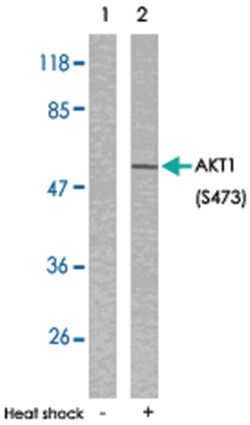Learn More
AKT1 (phospho S473), Rabbit anti-Human, Mouse, Rat, Polyclonal Antibody, Abnova™
Rabbit polyclonal antibody raised against synthetic phosphopeptide of AKT1.
Supplier: Abnova Corporation PAB25274
Description
The serine-threonine protein kinase encoded by the AKT1 gene is catalytically inactive in serum-starved primary and immortalized fibroblasts. AKT1 and the related AKT2 are activated by platelet-derived growth factor. The activation is rapid and specific, and it is abrogated by mutations in the pleckstrin homology domain of AKT1. It was shown that the activation occurs through phosphatidylinositol 3-kinase. In the developing nervous system AKT is a critical mediator of growth factor-induced neuronal survival. Survival factors can suppress apoptosis in a transcription-independent manner by activating the serine/threonine kinase AKT1, which then phosphorylates and inactivates components of the apoptotic machinery. Multiple alternatively spliced transcript variants have been found for this gene. [provided by RefSeq
Sequence: Q-F-Sp-Y-SSpecifications
| AKT1 | |
| Polyclonal | |
| Unconjugated | |
| Immunohistochemistry (1:50-1:100) Western Blot (1:500-1:1000) The optimal working dilution should be determined by the end user. | |
| AKT1 | |
| AKT/MGC99656/PKB/PKB-ALPHA/PRKBA/RAC/RAC-ALPHA | |
| Rabbit | |
| Affinity chromatography | |
| RUO | |
| 207 | |
| Store at -20°C. Aliquot to avoid repeated freezing and thawing. |
| Immunohistochemistry (PFA fixed), Western Blot | |
| 1 mg/mL | |
| Rabbit polyclonal antibody raised against synthetic phosphopeptide of AKT1. | |
| In PBS (without mg2+ and Ca2+), 150mM NaCl, pH 7.4 (50% glycerol, 0.02% sodium azide) | |
| P31749 | |
| AKT1 | |
| Synthetic phosphopeptide corresponding to residues surrounding S473 of human AKT1. | |
| 100 μg | |
| Primary | |
| Human, Mouse, Rat | |
| Liquid |
Your input is important to us. Please complete this form to provide feedback related to the content on this product.
For Research Use Only

